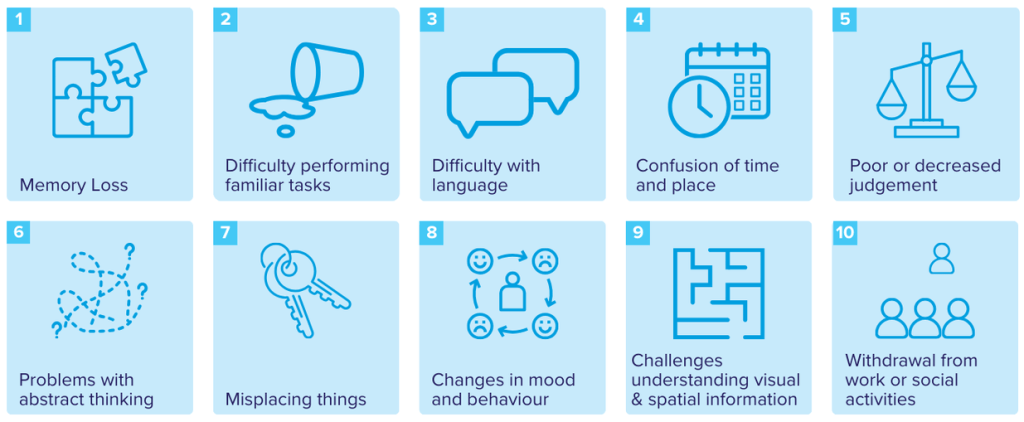I was talking with a friend the other day who is a similar age to me, and he was telling me that his memory was fading, so I asked him if he knew what are 10 ten warning signs of dementia were.
In short, he didn’t know and was a little surprised by my question, given I had to confess I didn’t know either.
So I did the research, and for all of you out there who are troubled by what you consider may be early onset dementia, here they are.
- Memory loss that disrupts daily life
- Challenges in planning or solving problems
- Difficulty completing familiar tasks
- Confusion with time or place
- Trouble understanding visual images and spatial relationships
- New problems with words in speaking or writing
- Misplacing things and losing the ability to retrace steps
- Poor judgment or decision-making
- Withdrawal from work or social activities
- Changes in mood and personality

Memory Loss as We Age
Memory loss can be a natural part of aging but is not necessarily a sign of dementia or Alzheimer’s disease. As we age, we may experience more difficulty recalling information, such as our phone numbers or the names of people we know, or we may find it harder to remember recent events.
Engaging in activities that stimulate and challenge the brain can help counteract age-related memory loss.
This can include activities such as doing puzzles, playing card games, reading books, writing, and engaging in conversations.
Regular physical exercise and a healthy, balanced diet with plenty of fruits, vegetables, and omega-3 fatty acids can also help improve memory.
Additionally, staying socially connected with family and friends is essential for maintaining cognitive health.
Is Repeating Yourself an Early Sign of Dementia
No, repeating oneself is not necessarily an early sign of dementia. It is pretty standard and can be seen in people of all ages.
It can be caused by several things, such as memory lapses, poor concentration, or simply a lack of interest in the conversation.
If you notice someone repeatedly saying the same thing, it is important not to challenge them.
A friend of mine’s father suffers from early-onset dementia, and he is happy to hear his father tell the same story multiple times because the alternative is something he is not looking forward to.
What Can I Do To Improve My Memory
- Get a good night’s sleep: Research has shown that sleep plays a crucial role in learning and memory.
- Exercise regularly: Exercise increases the flow of oxygen and nutrients to the brain, which helps to improve memory and cognitive performance.
- Eat healthy foods: Eating a balanced diet with plenty of fruits, vegetables, and whole grains can help keep your brain healthy and improve memory.
- Stay mentally active. Engaging your brain with puzzles, crosswords, and reading can help improve your memory.
- Stay socially active. Social interaction is essential for maintaining a healthy brain and can help improve memory.
- Manage stress: Stress can negatively impact memory, so try to find ways to reduce stress and manage it effectively.
- Practice mindfulness: Mindfulness techniques such as meditation and deep breathing can help to improve your memory and focus.
